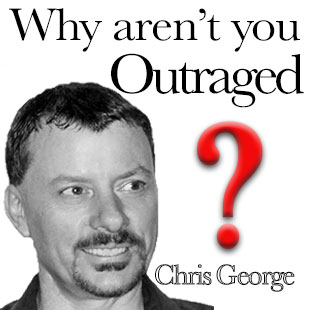
(CHRIS GEORGE / iNFOnews.ca)
September 18, 2018 - 12:00 PM
OPINION
I used to have great discussions with a young friend who was discovering libertarianism.
A major point of contention between us was my insistence that there are two paths to power; authoritative or the power of the state, and allocative or the power of wealth. Power was defined as the ability to get things done in society. His stance was that it is only authoritative power that is a problem in the world. My stance was that power and its concentration was the core problem, no matter its source.
The Trump administration in the United States has provided great fodder for discussions such as this.
In a recent news release, they have quietly declared that the United States no longer has an economic reason to conserve energy. The bottom line seems to be that no one in the administration has any faith in the reality of climate change and would place economic considerations first before all other concerns. Climate aside, I think they are wrong. There are still very good economic reasons to encourage conservation of fossil energy.
Peak oil, or the idea that a shortage of cheap oil will have serious consequences for the global economy, has been around for sixty years or so in the public sphere. As with climate change, it has been roundly ignored in the halls of power around the world. Unlike climate change no one is even paying it lip service, never mind taking steps to do something about it. A director of the American Petroleum Institute, a trade association, went so far as to claim that the idea of oil scarcity had been put to bed by recent increases in U.S. production and that economy crippling prices, like those we experienced in 2008, were a thing of the past.
Part of the problem is that peak oil is a very complex idea, requiring analysis of how oil markets work, geology, and geopolitics. The problem with the idea in society is the power of oil companies to have their way. It is the great wealth of these entities that allow them to drive our governments to do their bidding. In this case, allocative power has simply overwhelmed authoritative power, rendering one of the classic libertarian arguments about the state moot.
Physicist Tim Garrett examines the thermodynamics of our economy. In a recent article on economic wealth, he states that "...financial wealth is a human quantity, but we are still part of the physical universe. No matter how rich we may be, we are all equal subjects of its rules." It is this connection between society and the real world that gets shoved aside when we are talking about wealth and the economy. His writings are a great reminder that no matter how wealthy or powerful individuals or groups may be, at the end of the day we all live in the real world.
Energy underpins the economy. Fossil energy, in the form of oil, natural gas, and coal make up the overwhelming majority of our sources of energy. To declare that there is no good economic reason to be worried about consumption of what is a limited resource is foolishness. A classic argument against peak oil is that we are not running out and that there are vast quantities still in the ground. The argument leaves out the fact that we have already gone through most of the easy to liberate, high-quality fuels and are left mainly with the difficult to extract, expensive to refine energy sources.
And that is very much an economic problem. The world we have built relies on cheap energy. As the price of energy rises, other things in the marketplace are priced out of reach of regular people. 2008's $147 per barrel oil should have taught us that. And we here in the interior of British Columbia all got a taste of what $1.47 per litre for gasoline all summer can do to a household budget.
The U.S. administration's attempt to protect the oil industry, its shareholders, and apologists from climate change is a problem. Trying to divorce the same industry from prudent regulation that would protect the economy is foolhardy. As a citizen of a petrostate, we are seeing first hand what happens when the interests of a narrow slice of society are prioritized over the interests of the rest of us citizens. Allowing those interests to continue feeding us fantasies doesn't do anyone anywhere any good at all.
— Chris George believes one measure of a just society is found in how well it balances fiscally conservative economics with social responsibility and environmental soundness in all of its living arrangements.
We welcome your comments and opinions on our stories but play nice. We won't censor or delete comments unless they contain off-topic statements or links, unnecessary vulgarity, false facts, spam or obviously fake profiles. If you have any concerns about what you see in comments, email the editor.
News from © iNFOnews, 2018